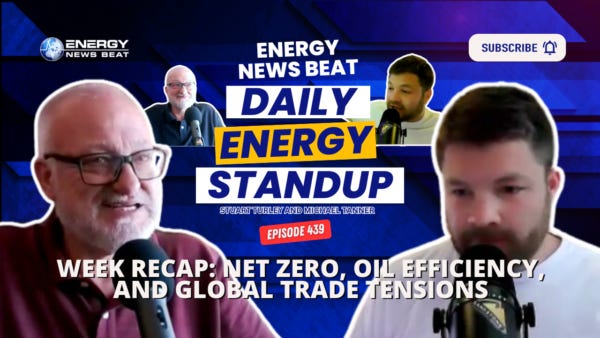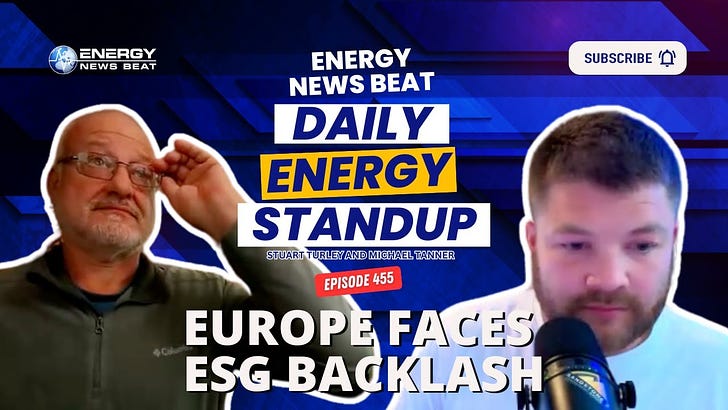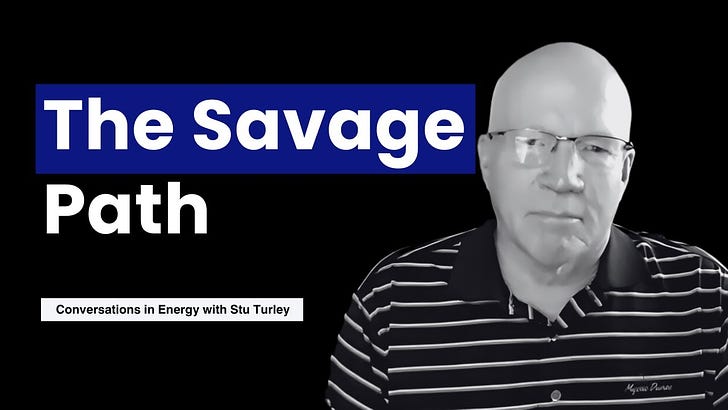Daily Standup Top Stories
Politicians Backing Net Zero Working Hard To Make Gas Prices Much Higher
The only way for ‘net zero’ politicians like Kamala Harris to eliminate gasoline is to make it unaffordable or illegal. Any politician who supports the “net zero” agenda is working to make gasoline […]
U.S. Oil Industry Pumps Record Volumes with Fewer Workers
The number of upstream and oilfield services jobs is flatlining and has started to fall. The hiring slump is not because production is falling. Efficiency and technological advances in fracking services, as well as the […]
We’re Burning More Climate-Warming Coal Than Ever. Why?
There’s little doubt that avoiding the most dire effects of climate change requires phasing out power stations that burn coal, the biggest source of carbon dioxide emissions. Yet the opposite is happening. Even as temperatures […]
Why the Strait of Hormuz Is a Focus of Worry Again
The Strait of Hormuz, a narrow waterway at the mouth of the Persian Gulf, is rarely far from the center of global tensions. A major shipping route that handles almost 30% of the world’s oil trade, […]
“Green” Hydrogen Subsidies Are 1,900x Larger Than What’s Given To Nuclear
ENB Pub Note: Please follow Robert Bryce on his Substack for great commentary and throught leadership in the industry. I have enjoyed my conversations with Robert and he is a great friend to the show. […]
When will the world hit peak oil?
Elon Musk’s Grok 2.0 is becoming a useful tool, and funny.
First, I want to let you know that I am very nervous about AI and its impact on humanity and our freedoms. That being said, I asked Grok 2.0 a few questions today, and it was very entertaining to generate responses.
Highlights of the Podcast
01:36 - Politicians Backing Net Zero Working Hard To Make Gas Prices Much Higher
05:05 - U.S. Oil Industry Pumps Record Volumes with Fewer Workers
09:50 - We’re Burning More Climate-Warming Coal Than Ever. Why?
12:13 - Why the Strait of Hormuz Is a Focus of Worry Again
14:54 - “Green” Hydrogen Subsidies Are 1,900x Larger Than What’s Given To Nuclear
17:50 - When will the world hit peak oil? Elon Musk's Grok 2.0 is becoming a useful tool, and funny.
Follow Stuart On LinkedIn and Twitter
Follow Michael On LinkedIn and Twitter
– Get in Contact With The Show –
Video Transcription edited for grammar. We disavow any errors unless they make us look better or smarter.
Michael Tanner: [00:00:14] Going on. Everybody, welcome into a special August 17th, 2024 edition of the Daily Energy News Beat. Stand up our weekly recap up for the week. Thank you for sticking with us. This is where we run our top stories from the entire week. As a busy week, a lot happened. [00:00:30][15.2]
Stuart Turley: [00:00:30] Oh, it's been a crazy week. And buckle up, it's going to be more friends. [00:00:35][4.5]
Speaker 1: [00:00:35] Yeah. Who knows? You'll be listening to this on Saturday or through the week, but any any crazy weekend predictions for us? [00:00:40][5.4]
Stuart Turley: [00:00:41] I'm just hoping it remains calm. I'm fearful of the worst, but I'm hoping for calm. [00:00:46][5.1]
Michael Tanner: [00:00:47] You fearful of the worst? Who would have guessed? But. Yeah. All right. But we're going to leave this up to the team now. They're going to pick out some stop stories. As always, guys, the news and analysis you're about to hear is brought to you by the world's greatest website, Energy News. Become the best place for all your energy and oil and gas news. Go ahead and hit the description below for all links to the timestamps. If you are interested in partnering up with us on our latest Energy and oil and gas project, you want to buy some direct working interest? Get your skin in the game when it comes to oil and gas. Hit that, description below or visit US Energy News beat.com to check out and we'll get you in contact with the powers that be, aka me. Talk a little bit more about what that looks like. Super excited to partner up with Ray Trevino and the crude truth on that one. But still, without further ado, let's go ahead and give it up to the team. We'll see you guys on Monday. [00:01:36][48.8]
Stuart Turley: [00:01:36] Politicians backing net zero. Working hard to make gas prices much higher. Unbelievable Michael. Net zero agenda is working to make gasoline prices much higher. Is basic arithmetic okay. You can go to Oklahoma State and they won't teach you how to add. They expect you to add when you get there. One mural plus two mural equals three mule. Hey I'm serious. Biden administration. That was funny. Biden administration supported the destruction of the fossil fuel. They wanted to end fossil fuels. Day one. They went ahead and they cut the the pipeline, the Keystone pipeline. You go through some of this whole list of gas gouging policies. Now, remember, you take a look at the other policies in here. And that is they're coming from California. They're trying to input California on the rest of the United States. And all that is, is net zero. And this is not good. [00:02:33][56.7]
Michael Tanner: [00:02:34] Oh, nothing like you see the EPA rolling out. They say in this article the quote social cost of carbon that they want to put it a $190 a ton, which would be somewhat equivalent to about a $1.50 addition per gallon of gas. [00:02:47][13.0]
Stuart Turley: [00:02:47] The social cost of carbon gas. What is soon as they get control of social media and they can kill X, they will go out and they will start fining you that. If you put a mean tweet out. [00:03:02][15.2]
Michael Tanner: [00:03:04] There, there, they'll be close to doing that. They'll be close to doing that. They this is a great article. I don't know who actually wrote this. Let me scroll down to the bottom here. This is energy talking points. Oh this is out of Alex Epstein. This is we love Alex. So he lays out eight different gas gouging policies. Basically you've got a whole of government approach. Oh crazy. You've also got Biden War two. So number two is Biden has worked to increase gasoline prices by expanding anti fossil fuel ESG divestment movement using. [00:03:35][31.2]
Stuart Turley: [00:03:35] Climate disclosure as number three. [00:03:37][1.8]
Michael Tanner: [00:03:37] Yep. Climate disclosures. You got a moratorium on oil and gas leases for number four. Hiking the royalty length for new oil leases by over 50% okay. We'll push back a little bit. New Mexico had a low royalty rate that was not in line with federal leases in other states. So what they did was just right size it all. I, I I'm okay with that from the standpoint of that's not going to go it's not killing production per se. But you know we'll go there. Number six is critical though, restricting the leasing on nearly 50% of the Alaskan Petroleum Reserve, not break FTC number seven, going after oil and gas mergers. I mean, we know that's true. All the stuff they've done Chevron, Exxon trying to lead Scott Sheffield off crazy. And then obviously number eight canceling the Keystone XL pipeline which you know, unbelievable. And of course now we got to ship it. [00:04:28][50.1]
Stuart Turley: [00:04:28] Oh absolutely. And now you see the Harris wall ticket is going to be even worse. So all right. [00:04:35][7.3]
Michael Tanner: [00:04:36] Well don't worry when Kamala Harris gets elected on day one she's going to bring down inflation. Don't worry. When she gets elected she'll bring down inflation. And mind you that she's already been elected. Oh yeah. Now she's been in right now. She should wait till she gets elected. Don't worry about it. [00:04:51][14.9]
Stuart Turley: [00:04:51] I saw that I saw her walk by and she made a comment and she says, I'm going to bring down grocery prices. I'm like, where have you been for the last four years? [00:05:00][8.7]
Michael Tanner: [00:05:00] You just go talk to the big guy. [00:05:01][1.1]
Stuart Turley: [00:05:02] Yeah. Hey, walk down the hall. Are you awake? Hello. U.S. oil industry pumps record volumes with fewer workers. You and I have been talking about the efficiencies of scale. For a long time, but efficiency and technology advancements and fracking services, as well as the ongoing consolidation in the industry, have been pushing employment numbers lower this year. Michael, what do you feel is the number one reason we lost 29 or 2962 jobs in May in oilfield service, but yet we're still pumping out some big volume. [00:05:37][35.0]
Michael Tanner: [00:05:37] Well, one, it's people are moving to to to, you know, bigger pads, larger, you know, longer laterals. You know, you need the same amount of people to drill a four mile laterals. You do a two mile lateral, but instead of needing drilling two wells at the same time, you only drill one. You get the same amount of lateral length. And let's not even talk about the amount of oil. There's a little bit of degradation as you go up the, you know, you you you you increase mileage. It's not a 1 to 1 ratio, which it might be. The difference is I think it comes back to what we always talk about when we talk about mergers. It's the synergies. Yeah. And this is this is what really hurts employment. And this is specifically I think oilfield service is seeing a lot of this because, you know, rig count hasn't you know, recounts have been falling on the steady. And that's always going to hurt. Right. Employment specifically on the server side. But I think what you're seeing and what this article points out is that the upstream sector, which is the operators themselves, have been shedding jobs and. Right. And I think a lot of people don't realize this because I think it's, you know, most people are, you know, it's early retirement. It's people who may have worked an extra five years who decide to get out of the industry now for a variety of reasons, because maybe they're getting pushed out. You know, they're being nicely told. Hey, would be nice if you retire people getting, you know, whether it's, you know, layoffs happening in a merger and then then people deciding not to go back in and get another and get a new job or, you know, the job market is, is, is is a little bit frothy right now when we talk about what's going on in the oil and gas. Yes, we've seen prices stabilize above 70, which has been great. But at the same time we've seen production continue to rise. And, you know, you've kind of got that inverse relationship would you think is would you think would be, you know, all related together. But instead we're seeing an inverse correlation. So it's super interesting. I think a lot of companies have realized, and especially as the shift from the shift from just produce oil to produce oil, but try to do it profitably, that's changed the narrative a little bit. And people are expensive. Let's not let's be honest, people and gas industry are paid really well as they should be. But people who are the highest paid employees in any sector are the first ones generally to get laid off. [00:07:50][132.4]
Stuart Turley: [00:07:50] Right. The EIA put out that. [00:07:52][1.8]
Michael Tanner: [00:07:52] The idea is to oh. [00:07:53][1.4]
Stuart Turley: [00:07:54] You're you're paid a lot more than I am because you're worth a lot more. The EIA expects crude oil production to average 12, 13.2 million barrels per day this year, up from an average of 12.9 million last year. In 2025, the U.S. crude oil production set to accelerate growth and hit an average of 13.7 million barrels per per day. [00:08:16][22.8]
Michael Tanner: [00:08:17] Yeah, we all know the EIA is going to continue to revise up and up. They feel like it's better to to pitch for sanity purposes, pitch low number and then revise upward based upon demand, which, you know, OPEC's probably the other way around. They're going to throw out a big demand number, probably revised downward. You're seeing the Permian take off. You're seeing a lot more degradation going on. It's it's it's there's a lot going on. [00:08:39][22.4]
Stuart Turley: [00:08:40] And in one thing I got to hand it to our great oil and gas oilfield service as well as oilfield exploration folks as we deliver the lowest emission oil and gas on the planet. We do the best out of anybody. [00:08:54][13.9]
Michael Tanner: [00:08:54] What I mean was, is, you know, you know, that the war in Ukraine, we're now bombing oil rigs. Yes. Regard. Yes, I know it's a Russian oil rig. So not saying I'm in favor of Russia, but I mean, you're talking about the amount of emissions that are going to come out of that. That and no one's talking about it. It's oh yeah, we got Russia. Okay, great. I'm all for getting Russia out and bad. I'm with you. Yeah. But now all of a sudden but now we're going to bomb oil rigs and no one's worried about the emissions. [00:09:21][26.6]
Stuart Turley: [00:09:21] Going. [00:09:21][0.0]
Michael Tanner: [00:09:22] On from that yet. We flare ten mics and everybody loses their mind. [00:09:26][4.5]
Stuart Turley: [00:09:27] But let's let's pretend we're California and hypocrisy and import oil from Iraq. Like we said last week, you know, on the on the show, the we're the fourth largest Iraqi. And I said I ran last week but it's actually Iraq that we import oil for California is a that's hypocrisy. We're burning more climate warming coal than ever. Why? I'll tell you what. When you take a look at this article is very interesting. It was on Bloomberg and our feed picked it up. When you take a look at how they, have you Arab allies is an outstanding author there. And, he is a shout out to him. He has to ask a couple questions. How reliant is the world on coal? And it's still unbelievable. It's coal is 35% of the world's, energy generation in 2023. Natural gas was second with 22%, hydro electric was 14 and nuclear was nine. And then in 2006 or 2014, coal was 40%. So, attributed bids come down 5%. But it's still this next chart. Global coal demand says that it's peaking in 2024. I don't buy it. I think this is actually wrong. And you're going to see peak. We haven't seen peak coal yet. Coal is still going to be around while developing countries, heavier planes developing countries value coal is cheap, convenient source of power so they can use to modernize their economies. Ding. And it is absolutely, I think, where the U.S. could really help solve climate emissions if you if you were and that is go out and sell our technology at a small profit, but sell how to deliver coal to, the rest of the world and, and do it cleanly. I think that you would get rid of energy poverty and and solve a lot of the problems. Anyway, two most populous nations face pressure to keep power flowing across the grid amid surging. That's China and India. And we're seeing nothing more than that. The country use, in 95% of the coal fired power plants in China in 2023. That's unbelievable. That's an amazing amount of information there. [00:12:12][165.8]
Stuart Turley: [00:12:13] Why the Strait of Hormuz is a focus worry again. Well, part of it is because, today is a religious holiday for, Israel. And they are pending an attack from, Iran. And then the, the Strait of Hormuz is, shaped like an inverted V. The waterway connects the Persian Gulf to the Indian Ocean and Iran with its north and and the United Arab Emirates and Oman to the south. It's 100 miles or 161km long and 21 miles wide. And it's narrow as point that's not very far. And the shipping lanes each direction two miles wide. And this feeds into you've got Iraq, Kuwait. So Saudi Arabia, Iran, lots of oil goes rolling around through this area in in here. It's essential to the global oil trade. Tankers all almost 15.5 million barrels per day of crude and candle condensate from Saudi Arabia, Iraq, Kuwait and the UAE and Iran through the strait in the first quarter 2024. Wow. That is a lot. 15.5 million barrels. That's a lot of tankers. And when we sit back and take a look, I am surprised that we're not seeing higher prices, on oil. At the time of this, we were at about 80 some odd dollars right at that for oil. Let me check here for just a moment and that the stock oil price is coming up and we are at 79, 65 for wow 7911 and 7964. So Brant and WTI is really where they are right there next to each other. The dollar is down just a little bit at a dollar three. That gas is at $2 and 80 $0.18 $0.19. So when we sit back and take a look Saudi Arabia exports the most through the Strait of Hormuz. And it's been recently diverting shipments by using a 746 mile pipeline across the kingdom to the Red sea, avoiding the Strait of Hormuz. And it's sending 1.5 million barrels a day via its pipeline to the port, of, through the Gulf of Oman. So if you can avoid it, avoid it. But, I'll tell you what, we are living in some crazy times here, so buckle up. [00:14:54][160.9]
Stuart Turley: [00:14:54] Hydrogen subsidies are 1,900% larger than what is given to nuclear. This is from Robert Bryce's Substack. You need to follow Robert Bryce. He is a friend of the show. He is absolutely a natural. Treasure. Bear with me while I read this one paragraph, because this is critical. Here in the U.S., the 45 the tax credit in the Inflation Reduction Act provides lucrative subsidies for hydrogen production. Big businesses lining up to get those subsidies. In February, energy Exxon energy giant ExxonMobil warned that it might cancel a proposed hydrogen project at its Baytown, Texas, refinery. Depending on how the Treasury Department interprets the clean hydrogen rules in the era, the Inflation Reduction Act, regardless of tax credits and subsidies, making and using hydrogen is a high entropy, high cost process. As a friend in the oil refining business told me last year, if you like $6 gasoline, you're going to love 14 to $20 a gallon of hydrogen. Hydrogen is insanely expensive in energy terms. The manufacture. It takes about three units of energy in the form of electricity to produce two units of hydrogen. In other words, the hydrogen economy requires scads of electricity and high quality form of electricity to make tiny molecules that are hard and difficult to expensive to store. Hence, the Hindenburg is not anything you want to name a business. [00:16:37][102.9]
Michael Tanner: [00:16:38] Yeah, I mean, that's that's like that's like naming your new well, Macondo. I mean, you might want to stay away from that. Yeah. I mean, I've been saying this for a while. I'm not putting hydrogen in my car for risk of it. Now it's turning it into a nuke. Much like stew wants to put small, modular nuclear reactors in everybody's car and turn everybody into a nuclear bomb. I'm not putting hydrogen in my car, but it's clear. I mean, they they want they want to dump subsidies into stuff that they feel like they can control. I guess this all goes back to control. Why do they like wind and solar? Well, be because it's not oil and gas. It's not captured. You know, whatever. It's all about control. They've got no d they could at the end of the day, they could care less where the energy comes from. As long as whoever makes the money off the energy donates to them. That's the difference. People that make money off wind and solar donate to them and not oil and gas comes down. [00:17:31][53.5]
Stuart Turley: [00:17:31] And wealth transfer because the grid. But you didn't. [00:17:35][3.3]
Michael Tanner: [00:17:36] Well transfer to people that they like. They don't mind people they like. They mind people they don't like getting rich. Why? We're poor here? Because they hate us. [00:17:43][7.2]
Stuart Turley: [00:17:43] Well, yeah, until we get our own tanker. I'm. I'm working on that. [00:17:47][3.4]
Michael Tanner: [00:17:47] Keep working on it, please. [00:17:48][1.0]
Stuart Turley: [00:17:49] Okay.
Stuart Turley: [00:17:49] Elon Musk over on X has a little bit of fun at his expense today. And Michael I first wanted to start how they got. Hey we got a new generation of rock out here. So I went great. Can you generate the first question I asked can you generate a offshore oil rig? Beautiful picture. I mean, it did. It was beautiful. I'm like, man, that's great. How about a Texas oil rig? You see a horse, you see a cowboy. It is beautiful. I'm like, we're on a roll. So I go down and I ask Grug this. Okay, when will the world hit peak oil? Michael, it goes, like, flat out. So you're asking about peak oil is response. Classic theory says pre peak oil will be in the mid 20th century suggesting it would occur around 0000. So I'm not sure what that was. But with technology advancements like fracking, deep sea drilling at unconventional sources, the peak has been pushed further into the future. Some argue peak have peak conventional oil, but overall liquid and hydrocarbons might not peak for a while. This one is brilliant. And then when you consider our next story coming around, the thing I'm like, this is really not bad. I was pretty impressed with this peak might be more about economics, environmental policy, and technological breakthroughs than physical limits of oil in the ground. What a great answer for this. [00:19:22][92.4]
Michael Tanner: [00:19:22] Yeah, to be honest, if it came up with an answer that I mean, maybe I'm biased, but I think this answer is fairly good. It's going to continue. Peak oil will continue to be pushed further and further into the future as we, you know, continue to advance technology as we continue to, you know, as prices continue to go high, assuming they continue to go high, more and more oil becomes unlocked. Because remember, peak oil has more to do with is it economically feasible to use the oil? Not necessarily. Is there oil? There's a lot of oil out there. The question is can it be economically produced? That's the key here. So no, I'm having some fun playing around with grok two. I've kind of been testing them all out. You know it's it's I love it says the grok in view. If we were to take a humorous yet realistic approach, peak oil might be like the horizon as it keeps moving. As we approach it. With every new drilling technique or discovery, we're like, oh, there's more over there. You're playing a video game where the boss keeps regenerating. It's almost like our podcast. We keep showing up every day. Every day we try to kill us. [00:20:26][64.0]
Stuart Turley: [00:20:27] We're back. We're like, yeah. And then I just wanted to, you know, a give it a balance of questions. And I said, is the deep state going to take over? And it shows me a picture of the redacted podcast. Of course you are. Apologies, but your input is more than a Hogan's ego. Please provide more anyway. But then I ask, what is a grunt used to train? And then it came back with an answer and I was very impressed with the answer. But it's still using a lot of Google, and we're seeing that the Biden administration and the Harris administration are paying for ads that are skewing and changing and news headlines. It's not news anymore. So I'm still nervous, Michael. Jury's still out for me. Hats off to Elon. Let's go to the next story, though. So I thought it was fun. Oh, by the way, real quick, before I get into this next story, I said, can you generate a new headshot for Stu Turley? You should have seen that good looking guy that popped up on that thing. [00:21:26][59.5]
Michael Tanner: [00:21:27] Oh, it definitely didn't resemble you at all. [00:21:29][2.7]
Stuart Turley: [00:21:30] No, not at all. I there's no way I could use that. I look, you know, there's no way. I was like, man, this thing's broken. There goes this whole story. [00:21:30][0.0][218.6]
















Week Recap: Net Zero, Oil Efficiency, and Global Trade Tensions